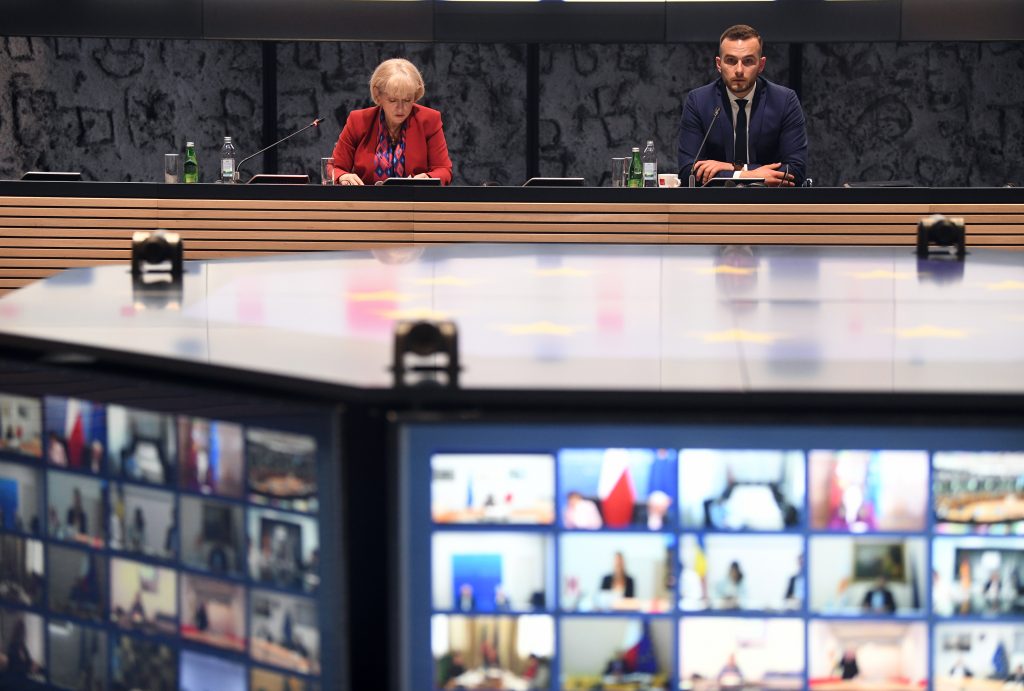
19.03.2020., Zagreb – U Nacionalnoj i sveucilisnoj knjiznici odrzan je videolink sastanak ministara Europske unije na kojem su prisustvovali Vesna Bedekovic i Josip Aladrovic. Photo: Josip Regovic/PIXSELL/EU2020HR
23/03/2020
EU Insight, 20 March 2020
EU BRACES FOR ECONOMIC IMPACT OF CORONAVIRUS WITH €750 BILLION ECB STIMULUS
With most EU Member States having introduced drastic measures to contain the spread of COVID-19, the possible devastating economic effects of the crisis have become as apparent as the acute health-related concerns. To counter the risk of economic collapse, Member States and EU institutions alike are introducing emergency measures which are expected to mobilise unprecedented sums of money to SMEs, the healthcare sector and other groups at risk. The response is aimed at providing Member States maximum flexibility within existing fiscal (i.e. stability and growth pact) and state aid rules. They will also have the backing of the European Central Bank, who launched a €750 billion pandemic-emergency purchase programme (PEPP).
COMMISSION STEPS UP COORDINATION OF MEDICAL RESPONSE TO OUTBREAK
In response to shortages of medical equipment to deal with the COVID-19 outbreak experienced by several Member States, the Commission adopted an Implementing Act to protect the availability of supplies of personal protective equipment (PPE), by requiring that exports of such equipment outside of the EU are subject to an export authorisation by Member States. This effort was complemented by the creation of a strategic “rescEU” stockpile of medical equipment such as ventilators and protective masks. The Commission has also launched an advisory panel on COVID-19 composed of epidemiologists and virologists from different Member States to formulate EU Guidelines on science-based and coordinated risk management measures.
PARLIAMENT TO ADOPT COVID-19 EMERGENCY LEGISLATION VIA WRITTEN PROCEDURE
The COVID-19 outbreak is significantly impacting the legislative activity of the EU institutions, who are taking exceptional measures to minimise the disruption. For instance, the European Parliament (EP) decided to adjust its legislative work until July, allowing for remote voting and for Committee and Group meetings to resume in an online format. Next week, the EP will hold an extraordinary mini-plenary session (replacing that of 1-2 April) to adopt the Commission’s proposals on the COVID-19 emergency. Whilst MEPs in Brussels will be invited to attend the session in person, voting will take place via written procedure for Members who are located remotely.
EU CLOSES EXTERNAL BORDERS FOR FIRST TIME EVER TO CONTAIN SPREAD OF VIRUS
As several EU Member States take exceptional measures to prevent the spread of COVID-19, including the introduction of border restrictions within the Schengen area, the Commission is trying to increase coordination among them. To this aim, this week the EU executive issued Guidelines on border management measures as well as on the consistent application of EU passenger rights. The Commission’s push for the lifting of internal borders was accompanied by the proposal to introduce a 30-day travel ban at the EU’s external borders (i.e. from the rest of the world into the EU), which all Member States strongly supported and will therefore implement.
COVID-19 HALTS FTA NEGOTIATIONS AMIDST RUMOURS OF TRANSITION EXTENSION
The European Commission published a draft legal agreement for the future EU-UK partnership, translating the negotiating directives approved by the Council of the EU last month into a legal text. However, given the COVID-19 developments, the EU and UK jointly decided to cancel this week’s second round of free trade agreement (FTA) negotiations. The situation is also expected to impact negotiations going forward, with the UK now shelving its plans to publish its own FTA, and rumours circulating of a potential extension to the Brexit transition period beyond end-2020. For now, work on the legal texts on both sides will continue over the coming weeks.
COMING UP NEXT WEEK
- 23 March: Foreign Affairs Council. On the agenda: Current affairs, pressing issues on the international agenda.
- 24 March: General Affairs Council.
- 26 March: European Council (videoconference). On the agenda: EU’s response to the COVID-19 outbreak.
Karl Isaksson, Managing Partner Brussels, Kreab
